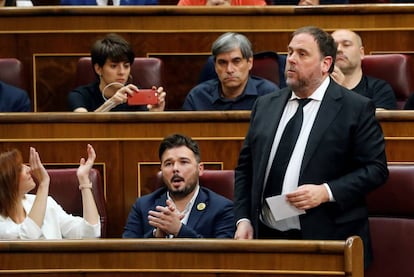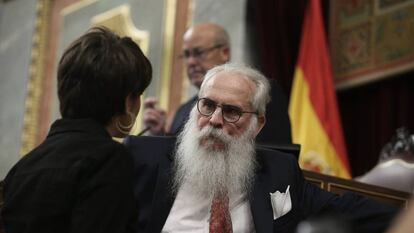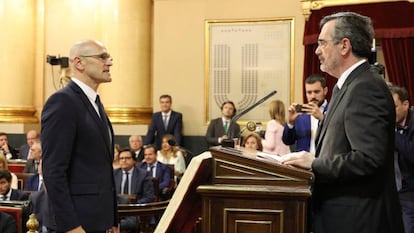Row over Catalans’ oaths sets the tone as Spanish Congress convenes
A highly fragmented lower house elects a new speaker, but is more divided than ever over separatist deputies, four of whom are currently being held in custody while on trial

The inaugural session of Spanish Congress on Tuesday gave a good indication of what to expect during the new political term inside a house that is more fragmented than ever following the snap election of April 28.
At a tense gathering that lasted slightly under five hours, four Catalan lawmakers who were allowed out of preventive prison to take oath used atypical formulas to swear allegiance to the Constitution they are on trial for allegedly breaking.
Each one of us is part of the people, but we are not the people
Congress speaker Meritxell Batet
Their words were nearly drowned out by shouts from other newly elected deputies, particularly those from the far-right Vox party, which has entered parliament for the first time on a promise to defend Spanish unity. Other opposition leaders said the separatists’ claims about political persecution were an insult to Spanish democracy, and accused the new speaker of the house, Meritxell Batet, of excessive leniency.
Oldest deputy-elect becomes a hit on social media

The new session of Congress got underway today under the guidance of three deputies-elect: Agustín Javier Zamarrón of the Socialist Party (PSOE), Marta Rosique of the Catalan Republican Left (ERC) and Lucía Muñoz of left-wing Unidas Podemos. The trio made up the so-called “Mesa de Edad,” literally the “Age Committee,” which is composed of the oldest deputy-elect, who acts as president, and the two youngest, who are there as secretaries.
The Mesa de Edad is charged with declaring the session of Congress open, before reading a Royal Decree and the list of deputies who will be taking a seat in the lower house of parliament.
Of the three, Zamarrón caused something of a stir on social media on Tuesday. He had run with the PSOE in Burgos at the last three general elections, but missed out on a seat in 2015 and 2016. Against all forecasts, he was lucky third time around, becoming, at 73, the oldest deputy of Congress.
A retired doctor, his expressions during the opening of Congress today were peppered with medical terms. “We are prone to a thrombosis in the pit,” he said into the microphones today, as the deputies filing through the chamber found that their path was blocked by groups of other parliamentarians. “Honorable deputies, please improve the flow,” was another of his comments.
With his long white beard and glasses, Zamarrón’s likeness to Spanish writer Ramón María del Valle-Inclán did not go unnoticed by users of social media. In fact, the surname “Valle-Inclán” was actually a trending topic on Twitter earlier in the day.
The whole event was presided by a 73-year-old deputy named Agustín Javier Zamarrón who became a trending topic on Twitter because of his uncanny resemblance to Ramón del Valle-Inclán, an early 20th-century writer famous for his fiercely satirical depictions of Spanish society (see sidebar).
New speaker
Meritxell Batet, a deputy for Barcelona with the Catalan branch of the Socialist Party (PSC), was elected the new speaker of the lower house with 175 votes in favor from her own group, from the leftist Unidas Podemos, and from the smaller regional groups Compromís, Basque Nationalist Party (PNV), Canaries Coalition and the Regionalist Party of Cantabria.
The main opposition Popular Party (PP), the center-right Ciudadanos (Citizens) and the Catalan separatist parties did not support the nomination. This configuration of forces could become a common sight at future votes inside a house where the Socialists and their allied parties are one seat shy of an overall majority.
In her acceptance speech, Batet urged lawmakers to work toward “building broad consensus.” She said that no single party can claim to represent Spain: “Each one of us is part of the people, but we are not the people.”
“We need to talk”
One of the most unusual scenes of the day was the handshake and brief exchange of words between acting Prime Minister Pedro Sánchez and Oriol Junqueras, the leader of the Catalan Republican Left (ERC), who is on trial for rebellion over the failed secession attempt of 2017. Junqueras and four other separatist leaders were allowed out of jail to attend the inaugural session of parliament, although they will likely be suspended until the Supreme Court reaches a verdict.
When he first entered the chamber, Junqueras walked right by Sánchez’s seat and both men shook hands. Later, around mid-morning, Junqueras approached the acting PM, who asked: “How are you doing?” To which the ERC leader replied: “We need to talk.”
The head of the Popular Party (PP), Pablo Casado, questioned Sánchez over this exchange and demanded “transparency” about the relationship between the Socialist leader and the Catalan separatists. Before winning the snap election, Sánchez had been accused by the opposition of making concessions to pro-independence parties in exchange for their political support.
Atypical oaths
The 24 deputies for Vox arrived early and took up the seats right behind the acting PM, even though this area is traditionally occupied by members of the Socialist group. Vox leader Santiago Abascal was the first deputy to pledge allegiance to the Spanish Constitution, and he did so with a: “For Spain, I do swear.”
But there was a wide variety of oaths. The most controversial formula was the one used by Catalan separatists, who introduced claims about being “political prisoners” and “compelled by law” to swear allegiance. Some swore “to the Catalan republic” rather than Spain, although their statements were barely audible amid the table-banging and shouts of “fuera, fuera” (out, out).
Members of the anti-austerity Podemos took their oath “for democracy and social rights,” while deputies for United Left promised to uphold “democracy and a republic.” There was one time when the entire chamber broke out in laughter: when Juan López de Uralde, leader of the green group Equo, took his oath “for democracy, for social rights, and for the entire planet.”
The din moved the new speaker to admonish the deputies: “What should be on display here today is not scenes of shouting and disrespect, but a display of refined intelligence, brilliant rhetoric and political defense. The former debases our representatives and offends the people they represent.”
English version by Susana Urra.
Socialist Party pick for Senate speaker assumes role

For the first time in 30 years, the Spanish Socialist Party (PSOE) has an absolute majority in Spain’s upper house of parliament, the Senate. In the wake of the April 28 general election – which was won by the PSOE, although it fell short of a majority in the lower house – the party has also been able to choose a new Senate speaker from among its ranks: Manuel Cruz.
After being sworn into the role today, Cruz – a Catalan university lecturer and former deputy in Congress – said that his “biggest ambition” is to contribute to the social and territorial cohesion of Spain, a clear reference to the ongoing independence drive in the northeastern region. Cruz, whose party has 140 seats of the 266 in the Senate, proposed dialogue, debate and agreement “from all territories and positions,” and argued that “all ideas and projects are legitimate and deserve to be recognized, heard and debated.”
He called for the Senate to “become, finally, what it was originally designed to be” – a chamber “focused on dialogue between the different administrations in the country and on the attention to and promotion of territorial cohesion in Spain.”
The politician was chosen for the role by acting Prime Minister Pedro Sánchez, after his first pick, Miquel Iceta – a key Socialist Party figure in Catalan politics – was rejected by the pro-independence parties in the parliament of Catalonia. Sánchez’s choices have been interpreted as symbolic given that both Cruz and Iceta are from Catalonia, with the acting PM seeking dialogue to try to heal the divisions between Madrid and the northeastern Spanish region.
There was plenty of media attention in the Senate on Tuesday for Raül Romeva, a pro-independence leader from the Catalan Republican Left (ERC) currently on trial in the Supreme Court for his role in the 2017 independence drive, and who was also voted in as a senator at the April 28 elections. Having been released by the judge in charge of the trial in order to assume his role as a parliamentarian, he entered the Senate today escorted by police officers. After having been sworn in to his role today, he is now waiting to find out whether or not he will be suspended as a senator given that he is currently being held in custody as the trial plays out.
English version by Simon Hunter.
Tu suscripción se está usando en otro dispositivo
¿Quieres añadir otro usuario a tu suscripción?
Si continúas leyendo en este dispositivo, no se podrá leer en el otro.
FlechaTu suscripción se está usando en otro dispositivo y solo puedes acceder a EL PAÍS desde un dispositivo a la vez.
Si quieres compartir tu cuenta, cambia tu suscripción a la modalidad Premium, así podrás añadir otro usuario. Cada uno accederá con su propia cuenta de email, lo que os permitirá personalizar vuestra experiencia en EL PAÍS.
¿Tienes una suscripción de empresa? Accede aquí para contratar más cuentas.
En el caso de no saber quién está usando tu cuenta, te recomendamos cambiar tu contraseña aquí.
Si decides continuar compartiendo tu cuenta, este mensaje se mostrará en tu dispositivo y en el de la otra persona que está usando tu cuenta de forma indefinida, afectando a tu experiencia de lectura. Puedes consultar aquí los términos y condiciones de la suscripción digital.








































